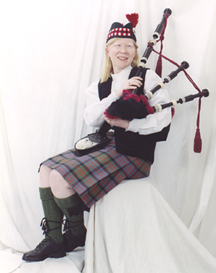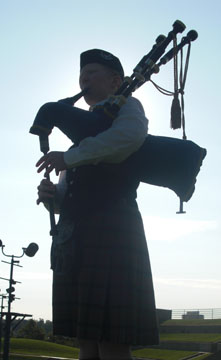
Sometimes people want to have bagpipes at an event and just don't know where to find a piper. It can be especially hard in a part of the country like Mississippi where there are not a lot of visible activities associated with piping. Then, once a piper is found, how do you know if he or she is a good piper? The difficult truth is that for people who are not familiar with piping, it can be hard to tell if a piper is worth paying for. Another stark reality is that some less-than-excellent pipers know this and take advantage of it. This can be the case with almost any variety of musician, but it seems to be especially true with bagpipes.
So here are some ideas to help locate and evauate a piper for your next event.
Finding a Piper
-
If you have no idea where to start, call the local funeral homes and churches. There's a good chance they have a piper or two listed for their events.
-
You can also call a loal college or university music department. They get quite a few of these calls, so they will be used to it. And if they don't know a piper, there's a good chance that they can find someone who does. Of course they might also suggest churhes and funeral homes, so hopefully you had luck in step one and you have not had to go this far.
-
If you think there might be a pipe band in your area, check with military and service organizations like the VFW, American Legion, Shriners, etc. They often make use of pipers and can possibly steer you in the right direction.
-
Get on the Internet and do a search for "bagpipes," "bagpipers," "piper," or variations of those words with the name of your city and state.
Choosing a Piper
Often pipers are located and hired at the last minute, and in these cases, you often have to take what you get, and it is usually satisfactory for the job at hand.
It is fair, however, especially for a big event with lots of time for advanced planning, to ask a piper to come and play a sort of audition. Any piper worth his or her salt, should be able to belt out a few tunes with little notice and even play a reasonable number of requests, provided they are standard Scottish or celtic tunes. It is also not unusual for a piper to learn a specific tune or two for an event, given that there is time to prepare and ample compensation provided forthe time spent learning and practicing something special.
Feel free to ask questions about how long the piper has played and how he or she got into piping, if the piper is in a band, what kinds of gigs he has played before. Most pipers love to talk about themselves.
When a piper plays, just watch and listen for a few things that are good clues to ability. For instance, the satndard for pipers is to memoriize their music. Rarely if ever will you see a piper using sheet music, espeically on a tune like Amazing Grace or Scotland the Brave. But on this same note, some pipers will be able to sightread a new tune or two on the pipes for you to hear basically how it might sound if he learns it for your event. This is of course contingent on sightreading ability and the difficulty of the tune.
Another sign of a good piper who practices daily is an instrument that starts easily and tunes quickly. And when the piper plays, watch posture and demeanor. The best pipers make it look easy, but a reasonably good piper will at least not seem to be having a fight with the pipe or straining to play it. The chanter should sound continuously without wavering or bending notes and the drones should be steady and in tune. Contrary to what some people believe, bagpipes are supposed to be in tune and the drones are not supposed to start and stop with all manner of weird noises.
All this having been said, also bear in mind that nobody's perfect. Even a good piper can have a bad day or a sudden and unexpected mechanical problem. Bagpipes are very complex and the equivalent of playing four woodwind instruments at once, so many more things are likely to go awry. This is the time to watch how the piper deals with trouble. Does he know how to fix it quickly? A good piper will be prepared for an emergency and normally have it dealt with in a matter of minutes.
Once the pipe is in tune and going, just listen to the music. Is the beat steady? (Yes, it is common practice for pipers to tap their foot while playing, unlike with many other musicians.) Can you follow the tune? Remember that pipe music should sound like music. Just because pipes sound kind of weird, doesn't mean the music is supposed to be hard to understand or follow. It can't just sound like bagpipes. It has to be pleasing to hear. If you can't find a tune in it, there's probably a tempo issue.
If you want to hear a few pipers before you choose one, that is your prerogative, and it shouldn't hurt any piper's feelings if you say that you will be in touch after some more auditions.
How to Treat a Piper
-
First, treat a piper like you would any other musician. The bagpipe is not a novelty. Pipers have spent many years and many hours of practice learning their craft. In fact, the pipes are more difficult to play than most other instruments, not to mention all the funny clothes we have to wear when we play. This having been said, pipers are only human. So treat us like people as well as musicians.
-
Remember, pipers aren't just for funerals. We like to play at happy things too. Think of us for weddings, grand openings, church services, parties, banquets, ceremonies, etc. People will never forget your event if you have good bagpiping.
-
Call the piper as soon as you can. Have a meeting or two to solidify what will be needed. We like advance notice, especially if you want us to learn a specific tune. And if you have a rehearsal, let the piper know. Many pipers are very good at doing things on the fly, but if it is possible to rehearse, it is preferred.
-
Get the uncomfortable stuff out of the way. Don't wait till after the gig to bring up payment. Get it sorted out and nailed down in the first or second conversation. Don't leave it to the piper to bring it up. Some pipers will mention it if you don't, but others won't, and it is only fair to pay them for services rendered. I think a lot of people believe that since artists and musicians do something that is percieved as 'fun' that they don't need or don't care to be well-paid for what they do. It is fun to play the pipes - or any other instrument for that matter - but there are many hours of time spent that you never see. A piper mght spend four hours practcing for a thirty-minute performance of easy tunes. And this does not count the hours of time and hundreds of dollars worth of materials which have gone into the process of learning to play.
Many pipers won't show up for less than $100. And this is comparable to or even under what many other musciains get paid. So when you are negotiating a payment, keep in mind how much music you want, how much practice time it might take to prepare it, how much rehearsal time that you will require, how much of the piper's time will be needed for the event, and if there will be any travel or meal expenses for the piper. All this will figure into the final rate.
But don't pay too much either. As with many other things, a piper should be paid, and should also bill, based on his or her ability. For esample, I'll play some tunes at a wedding for $200, but if you hire Jim McGillivray (one of the best pipers in North America) to do it, he'd probably charge at least $500, not including travel, etc.

-
In all fairness, if you have paid for services rendered, that's all you are bound to do, but most pipers like to hear a word or two of thanks as well, just so we know that you are happy with what we have done. Most of us like to think that our customers feel like their money is well spent or that they might recommend us to someone else. And it also gives us a nice memory of playing your event. When the payment we receive has been long spent on new chanter reeds or kilt hose, we will always remember being acknowledged and well-treated.
One of my most memorable gigs was a funeral. The family was very grateful that I could come out and, in addition to providing me transportation to and from the service, they invited me to a sort of celebration afterward (they were Catholic). I felt very welcome and included and I even offered to pipe a little at the "party." I played a few Irish tunes and got all the Dr Pepper I could drink. It was great, and I really will remember it forever.
I hope this has helped anyone out there looking for a piper. And if you are in the Fort Worth, Texas area and you need a piper, don't hesitate to contact me. It would be my pleasure to play at your event.

|



